Aedes mosquitoes, which transmit the dengue virus, are breeding in places in Kolkata that were not commonly known as breeding sites, a more intense vigil this year has revealed.
Cracks in canal/drain embankments, cavities in trees and bamboo fencings along gardens are among the breeding spots, said vector-control workers of the Kolkata Municipal Corporation (KMC) who are visiting neighbourhhoods as part of the dengue prevention drive.
Vector-control experts said it was almost impossible for the authorities todetect all such sites because there are numerous trees, embankments and bamboo fences in and around the city. Residents would also have to be careful and keep vigil, they said.
“Usually we look for garbage dumps, particularly on empty plots, abandoned tyres, flower pots, air-conditioners, concrete slabs around taps and other conventional breeding sites of Aedes mosquitoes. But, more intense vigil has revealed that they are laying eggs in other sites, too, such as tree cavities,” said a KMC vector-control worker who is in charge of a ward in south Kolkata.
The rainwater accumulates in those places. Since the spots remain mostly unidentified, the larvae grow there in large numbers, said the KMC worker.
Dengue cases are on the rise in and around Kolkata.
Anima Sardar, 45, a Thakurpukur resident, died at MR Bangur Hospital on Friday afternoon after contracting dengue. “The primary cause of her death is dengue,” said a state health department official.
Sardar, who was from Baruipur, was living in a rented apartment in Thakurpukur for the last six months, the official said.
“She was admitted to Vidyasagar State General Hospital in Behala on Thursday afternoon. When her condition deteriorated, she was shifted to MR Bangur Hospital late on Thursday. She passed away on Friday afternoon,” the official said.
Last week, a 30-year-woman, who was a resident ofBangur Avenue, in theLake Town police station area, died at a hospital in the city after testing positive for dengue.
A 10-year-old girl from Picnic Garden died at a city hospital last Saturday after testing positive for dengue.
A few more deaths have been reported from the state in recent weeks. The state government, however, has not released any death toll or the number of people suffering from dengue.
Aedes aegypti and Aedes albopictus mosquitoes, the two varieties that spread the dengue virus, breed in freshwater.
“Researches have shown that the Aedes mosquito has breeding sites in the wilderness like trees. The mosquitoes then migrate to human habitats, causing dengue,” said a vector-control expert in Delhi.
“The problem is that vector-control workers of local bodies often tend to ignore such sites and concentrate on obvious breeding grounds, such as tyres and garbage dumps,” said the expert.
According to the expert, when a more intense vigil is taken up, such unconventional sites are discovered.
The Telegraph reported on Friday that the state government has made an elaborate plan to fight dengue, focusing on cleanliness and diagnostic tests.
A KMC vector-control worker said they would routinely find and destroy Aedes mosquito larvae at conventional sites.
“This year, we are also focussing on unconventional sites and found Aedes larvae in the cavities of several trees in our area. We have shown the larvae to the owners of the houses where such trees have been identified and asked them to keep a check so that rainwater does not accumulate there,” he said.
In concrete embankments along canals or drains, KMC workers have detected Aedes larvae in small cracks where a small amount of freshwater stays as residue.
“During this summer, we kept containers of freshwater in areas from where multiple dengue cases had been reported. Although there was no mosquito visible in the locality, after seven days Aedes larvae were found in the containers,” he said.
According to another supervisor of the vector-control programme in another KMC ward, mosquito-breeding spots were detected in broken lights placed on walls. He said the residents have been asked to replace broken lights with new ones or keep the damaged ones clean.
“We have trained our vector-control workers to spot mosquito-breeding sites in trees and bamboos. The simple way to stop breeding is by pouring soil into these holes,” said a KMC official.
“We have to disseminate this knowledge to people. Vector-borne diseases cannot be controlled without active participation of the community,” said the official.
